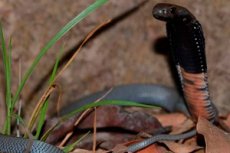New publications
The first effective cure for a spitting cobra bite has been found
Last reviewed: 02.07.2025

All iLive content is medically reviewed or fact checked to ensure as much factual accuracy as possible.
We have strict sourcing guidelines and only link to reputable media sites, academic research institutions and, whenever possible, medically peer reviewed studies. Note that the numbers in parentheses ([1], [2], etc.) are clickable links to these studies.
If you feel that any of our content is inaccurate, out-of-date, or otherwise questionable, please select it and press Ctrl + Enter.

Scientists have discovered a new treatment for snake bites that prevents tissue destruction caused by the venom of the African spitting cobra.
Spitting cobra venom is extremely potent and causes dermonecrosis, which is the rapid destruction of skin, muscle, and bone around the bite site. This can lead to permanent injury and disfigurement, including loss of limbs and amputations in extreme cases.
Professor Nicholas Caswell and colleagues from the Liverpool School of Tropical Medicine, including Dr Stephen Hall, now at Lancaster University, found that using a repurposed drug, varespladib, to block one of the two main toxins that cause dermonecrosis in spitting cobra venom prevented damage to the skin and muscle.
Every year, snakebites cause long-term negative consequences in about 400,000 people worldwide, with a significant proportion of these cases in Africa due to spitting cobra bites.
There is currently no effective treatment for severe local envenomation caused by spitting cobra venom. Existing antitoxins only work against bites from other snake species and are often ineffective for treating local envenomation because the antibodies in the antitoxins are too large to penetrate the area around the bite site.
Professor Caswell said: "Our findings promise to significantly improve the treatment of snakebites in tropical regions. Current treatments for spitting cobra bites are widely recognised as ineffective, leading to high rates of disability and amputation in most parts of Africa. Our data show that blocking just one of the main families of toxins in spitting cobra venom is likely to prevent the tissue destruction that affects thousands of patients each year."
Professor Caswell’s team, led by PhD student Keira Bartlett and Dr Steven Hall, and researchers from Canada, Denmark, Costa Rica and the US, first analysed spitting cobra venom to identify the toxins that cause dermonecrosis. The results showed that cytotoxic three-finger toxins (CTx) were the main culprits, but phospholipase A2 (PLA2) also played a role in the process.
Local administration of the PLA2 inhibitor varespladib reduced the extent of dermonecrosis even when administered an hour after the bite, and the protection provided by the drug also extended to venom-induced muscle toxicity.
The study's findings suggest that varespladib could be a valuable treatment against tissue damage caused by the venom of black-naped and red spitting cobras, which cause significant suffering in snakebite victims across the African continent, the authors said.
Lead author Dr Hall said: " Snake bites are a devastating neglected tropical disease in which venom-induced tissue necrosis results in permanent injury to hundreds of thousands of victims each year."
"Our work shows that the drug varespladib is extremely effective in inhibiting necrosis caused by African spitting cobras. This is particularly important as their venoms act very quickly and are very destructive. We hope that this research will pave the way for future snakebite therapies that could save the lives and limbs of victims around the world."
PhD student Keira Bartlett added: "These results are very promising; not only because it is a new treatment where nothing effective has existed before, but also because varespladib has already been tested in human clinical trials, including snakebite tests, and may soon be available to real patients."
Professor Caswell’s team is already looking for viable treatments that effectively block CTx toxins. Having a treatment against both toxins could greatly improve the effectiveness of varespladib and significantly reduce the long-term consequences associated with spitting cobra bites in Africa and beyond.
The results of the study were published in the journal Proceedings of the National Academy of Sciences.
